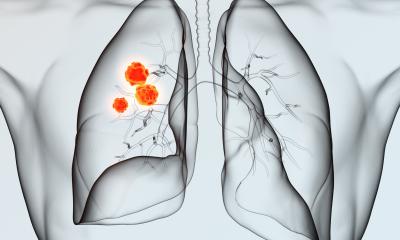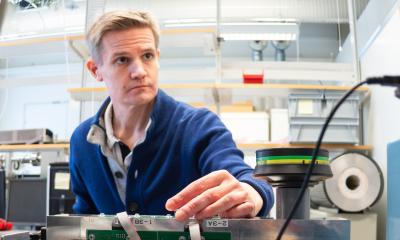News • NHS rollout
Liquid biopsy: new ‘blood test-first’ approach for lung cancer
A new ‘liquid biopsy’ test can help fast-track lung cancer patients to receive targeted therapy up to two weeks earlier, while helping some avoid further tests and treatments including chemotherapy.

Image source: University of Newcastle
The move will see the NHS become the first health service in the world to roll-out a ‘blood test-first’ approach to diagnosing suspected lung cancer, with the test to be used before traditional tissue biopsies.
Following a successful pilot, which was co-led by Professor Alastair Greystoke, NHS England announced up to 15,000 patients with suspected lung cancer could now benefit from the test each year, which can detect tiny fragments of tumour DNA in the blood.
An independent health economic assessment of the pilot estimated the test could save the NHS up to £11 million per year in lung cancer care, and the NHS is now looking at its use in a range of other cancers, including pancreatic and gallbladder cancer.
Liquid biopsy testing is now available for all eligible lung and breast cancer patients in NHS hospitals across England, with more than 1,600 patients with suspected lung cancer and around 600 advanced breast cancer patients tested since April. Breast and lung cancers are two of the most common cancers in England – with around 50,000 women diagnosed every year with breast cancer, and around 40,000 people are diagnosed with lung cancer per year.
The blood test, also called a ‘liquid biopsy’, can detect tiny fragments of circulating tumour DNA (ctDNA) and looks for specific genetic variations of cancer, allowing patients to access targeted therapies which are tailored to the genetic profile of their cancer.
Pilot data in lung cancer showed that in some cases, patients received the results of ctDNA testing needed to make treatment decisions 16 days earlier with liquid biopsies, than the standard cancer tissue biopsy approach. NHS pilots in suspected lung cancer patients found that as well as reducing time to treatment, liquid biopsies helped patients avoid repeated diagnostic procedures, unnecessary treatment, such as standard chemotherapy and its side effects, and improved patients’ quality of life.
Around 10,000 patients with the most common type of lung cancer – non-small cell lung cancer – have already had a liquid biopsy test as part of a recent NHS pilot which involved around 176 hospitals around the country.
Not only has it led to faster and more precise treatment for patients with lung cancer, but we have also been able to show that this is a cost-effective measure for the NHS and set up the framework to evaluate this in other cancers going forward
Alastair Greystoke
Tissue biopsies are used to confirm a diagnosis of lung cancer and samples can be sent for genomic testing, but liquid biopsies mean patients can get results showing mutations much faster, with patients then able to access targeted therapies around two weeks earlier than the standard cancer tissue biopsy approach.
Professor Peter Johnson, NHS national clinical director for cancer, said: “Liquid biopsies are leading us into a new era of personalised cancer care and it’s fantastic that we are now able to expand the use of this revolutionary test on the NHS to help tailor treatment for thousands of patients across the country. Cutting-edge genomic testing is helping us deliver more targeted and kinder care for patients, enabling some to avoid more intensive treatments such as further chemotherapy, which can have a huge impact. We are already seeing the difference this test can make in lung and breast cancer – and we hope to roll it out for patients with other forms of cancer in the near future. As research progresses, it’s exciting that this approach has the potential to help us ‘scan’ the body in a single blood test to see where and how cancer may be developing and target it with speed and precision to help save more lives.”
Health and Social Care Secretary Wes Streeting said: “This incredibly exciting new test could save countless lives, giving thousands of people peace of mind. It is just the latest example of this government combining the compassionate care of our National Health Service with the ingenuity of Britain’s leading scientific minds to revolutionise cancer care. Thanks to this government’s investment and modernisation, we have already delivered faster diagnoses for tens of thousands of suspected cancer patients, and there’s much more to come. Through our Plan for Change we are investing in cutting edge modern treatments and tests to make our NHS fit for the future.”
Professor Alastair Greystoke, co-clinical lead of the ctDNA pilot and honorary medical oncologist at the Newcastle Hospitals and Clinical Senior Lecturer, Newcastle University, said: “This is the first ever national implementation of a ‘liquid biopsy first’ approach to the diagnosis and treatment of a cancer. Not only has it led to faster and more precise treatment for patients with lung cancer, but we have also been able to show that this is a cost-effective measure for the NHS and set up the framework to evaluate this in other cancers going forward.”
Source: Newcastle University
06.06.2025





